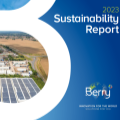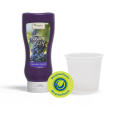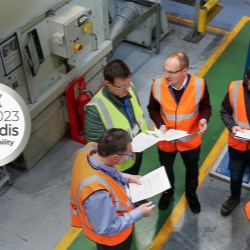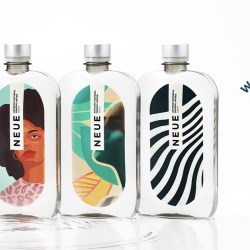.png)

Innovation, sustainability, and the latest developments in plastic materials and processing technologies were the key themes of the Berry Global stand at this year’s FachPack.
Reflecting the exhibition’s major focus on sustainable packaging solutions, the Berry stand demonstrated how plastics’ versatility and design flexibility can continue to play a vital role in today’s environmentally conscious modern world.
Plastics’ light weight means the material is a suitable choice for e-commerce packs to meet the demands of the fast-growing online shopping market. Both Berry Bramlage and Berry M&H presented their ranges of e-commerce solutions that offer functionality and attractiveness to promote and enhance brand image while helping to reduce the environmental impact of transportation and delivery.
A major example of this was the award-winning Garçon Wines’ 750ml slimline wine bottle, produced by Berry M&H. One of the first wine bottles in the world to be manufactured from recycled PET, the unique slimline design can fit securely and conveniently through a standard sized letterbox.
Many of the packs on display – from the pails and paint containers of Berry Superfos to personal care jars and dispensers from Berry Bramlage – demonstrate Berry’s ability to incorporate recycled plastic into a pack’s manufacture without compromising on its performance. One of the latest material innovations was the introduction of Berry Bramlage’s popular Empress Light Jar with the outer layer of the jar manufactured in 95% post-consumer recycled (PCR) plastic that incorporates a colour masterbatch. This offers brand owners in the beauty and cosmetics sector greater choice and flexibility in the development of more sustainable packs.
The recently launched Sustainability Grading Tool underlines the importance that Berry attaches to sustainability as part of the product design process. A key requirement of this is to ensure that a pack’s recyclability is maximised. Examples on show included Berry Bramlage’s Magic Star and Magic Pur airless dispensers incorporating a plastic spring, and the company’s new lip care stick featuring a three-piece design manufactured completely in polypropylene for ease of recycling that at the same time offers improved usability and functionality.
Berry bpi displayed its new X-Enviro Laminate film that offers a recyclable alternative to traditional laminated films. As well as being recyclable where appropriate collection schemes operate, the film creates a superior look and feel thanks to its high gloss, resulting in an attractive point of sale appearance for packed products. Its excellent stiffness and strength also allow the production of stand-up pouches. In addition, Berry bpi is further enhancing X-Enviro Laminate’s sustainability by producing a film containing up to 50% post-consumer waste as well.
With single serve drinks systems continuing to grow in popularity, there is an increasing requirement to balance the demand for capsules with sustainable packaging solutions. Berry Bebo’s B2nature™ capsules can be industrially composted while still delivering long-term protection of the contents and being able to withstand the high pressurised operation of coffee machines.
Food waste is another widely acknowledged sustainability challenge. The variety of barrier technologies from Berry demonstrated the company’s ability to provide effective product protection to preserve freshness and extend shelf-life. Packs on show included the IMDA (In-Mould Decorating Association) Award-winning label for Heinz Cream of Tomato Pot Soup and Vegetable Pot Soup on a 400ml SuperLock® container from Berry Superfos. The autoclave resistant oxygen barrier label combines with the SuperLock® pot to allow post-filling sterilisation up to 120°C for 80 minutes and provide a long shelf-life even under ambient conditions. In addition, the wide choice of pack sizes on display and availability of reclosable packs demonstrated how Berry food packaging solutions can help provide effective portion control.
Throughout the Berry stand there were also numerous examples of how the Company’s packs can be effectively reused. One high-profile example was the range of Sæplast double-walled, insulated tubs and three-layer, specially strengthened PE tubs and palettes for use in the manufacture of food products and in the recycling industry. As well as their strength and durability, the tubs’ high insulating capacity provides excellent product protection and the smooth surface ensures easy cleaning and greatly improves food safety.


 (1).jpg)
.png)











































